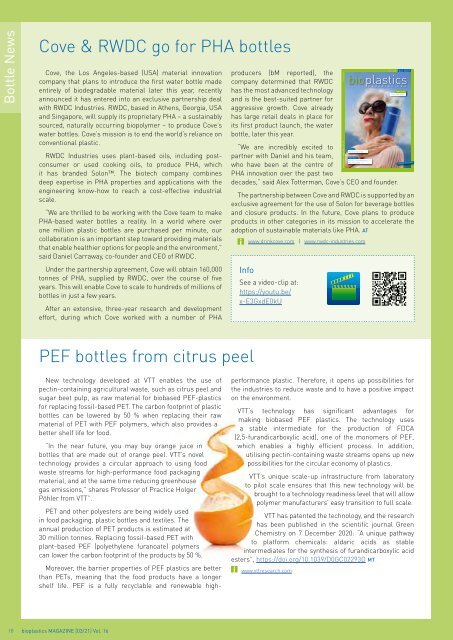issue 03/2021
Highlights: Bottles / Blow Moulding Joining Bioplastics Basics: Carbon Capture
Highlights:
Bottles / Blow Moulding
Joining Bioplastics
Basics: Carbon Capture
- No tags were found...
You also want an ePaper? Increase the reach of your titles
YUMPU automatically turns print PDFs into web optimized ePapers that Google loves.
WWW.MATERBI.COM<br />
05/05/17 11:39<br />
Bottle News<br />
Cove & RWDC go for PHA bottles<br />
Cove, the Los Angeles-based (USA) material innovation<br />
company that plans to introduce the first water bottle made<br />
entirely of biodegradable material later this year, recently<br />
announced it has entered into an exclusive partnership deal<br />
with RWDC Industries. RWDC, based in Athens, Georgia, USA<br />
and Singapore, will supply its proprietary PHA – a sustainably<br />
sourced, naturally occurring biopolymer – to produce Cove’s<br />
water bottles. Cove’s mission is to end the world’s reliance on<br />
conventional plastic.<br />
RWDC Industries uses plant-based oils, including postconsumer<br />
or used cooking oils, to produce PHA, which<br />
it has branded Solon. The biotech company combines<br />
deep expertise in PHA properties and applications with the<br />
engineering know-how to reach a cost-effective industrial<br />
scale.<br />
“We are thrilled to be working with the Cove team to make<br />
PHA-based water bottles a reality. In a world where over<br />
one million plastic bottles are purchased per minute, our<br />
collaboration is an important step toward providing materials<br />
that enable healthier options for people and the environment,”<br />
said Daniel Carraway, co-founder and CEO of RWDC.<br />
Under the partnership agreement, Cove will obtain 160,000<br />
tonnes of PHA, supplied by RWDC, over the course of five<br />
years. This will enable Cove to scale to hundreds of millions of<br />
bottles in just a few years.<br />
After an extensive, three-year research and development<br />
effort, during which Cove worked with a number of PHA<br />
producers (bM reported), the<br />
company determined that RWDC<br />
has the most advanced technology<br />
and is the best-suited partner for<br />
aggressive growth. Cove already<br />
has large retail deals in place for<br />
its first product launch, the water<br />
bottle, later this year.<br />
“We are incredibly excited to<br />
Basics<br />
Home composting | 44<br />
partner with Daniel and his team,<br />
Highlights<br />
Bottles / Blow Moulding | 10<br />
Biocomposites | 24<br />
who have been at the centre of<br />
PHA innovation over the past two<br />
decades,” said Alex Totterman, Cove’s CEO and founder.<br />
The partnership between Cove and RWDC is supported by an<br />
exclusive agreement for the use of Solon for beverage bottles<br />
and closure products. In the future, Cove plans to produce<br />
products in other categories in its mission to accelerate the<br />
adoption of sustainable materials like PHA. AT<br />
Info<br />
www.drinkcove.com | www.rwdc-industries.com<br />
See a video-clip at:<br />
https://youtu.be/<br />
x-E3GxdE0kU<br />
EcoComunicazione.it<br />
r1_05.2017<br />
bioplastics MAGAZINE Vol. 14 ISSN 1862-5258<br />
Jul / Aug<br />
04 | 2019<br />
Cover Story<br />
Cove PHA bottles<br />
... is read in 92 countries<br />
PEF bottles from citrus peel<br />
New technology developed at VTT enables the use of<br />
pectin-containing agricultural waste, such as citrus peel and<br />
sugar beet pulp, as raw material for biobased PEF-plastics<br />
for replacing fossil-based PET. The carbon footprint of plastic<br />
bottles can be lowered by 50 % when replacing their raw<br />
material of PET with PEF polymers, which also provides a<br />
better shelf life for food.<br />
“In the near future, you may buy orange juice in<br />
bottles that are made out of orange peel. VTT’s novel<br />
technology provides a circular approach to using food<br />
waste streams for high-performance food packaging<br />
material, and at the same time reducing greenhouse<br />
gas emissions,” shares Professor of Practice Holger<br />
Pöhler from VTT”.<br />
PET and other polyesters are being widely used<br />
in food packaging, plastic bottles and textiles. The<br />
annual production of PET products is estimated at<br />
30 million tonnes. Replacing fossil-based PET with<br />
plant-based PEF (polyethylene furanoate) polymers<br />
can lower the carbon footprint of the products by 50 %.<br />
Moreover, the barrier properties of PEF plastics are better<br />
than PETs, meaning that the food products have a longer<br />
shelf life. PEF is a fully recyclable and renewable highperformance<br />
plastic. Therefore, it opens up possibilities for<br />
the industries to reduce waste and to have a positive impact<br />
on the environment.<br />
VTT’s technology has significant advantages for<br />
making biobased PEF plastics. The technology uses<br />
a stable intermediate for the production of FDCA<br />
(2,5-furandicarboxylic acid), one of the monomers of PEF,<br />
which enables a highly efficient process. In addition,<br />
utilising pectin-containing waste streams opens up new<br />
possibilities for the circular economy of plastics.<br />
VTT’s unique scale-up infrastructure from laboratory<br />
to pilot scale ensures that this new technology will be<br />
brought to a technology readiness level that will allow<br />
polymer manufacturers’ easy transition to full scale.<br />
VTT has patented the technology, and the research<br />
has been published in the scientific journal Green<br />
Chemistry on 7 December 2020: “A unique pathway<br />
to platform chemicals: aldaric acids as stable<br />
intermediates for the synthesis of furandicarboxylic acid<br />
esters”, https://doi.org/10.1<strong>03</strong>9/D0GC02293D MT<br />
www.vttresearch.com<br />
18 bioplastics MAGAZINE [<strong>03</strong>/21] Vol. 16


















